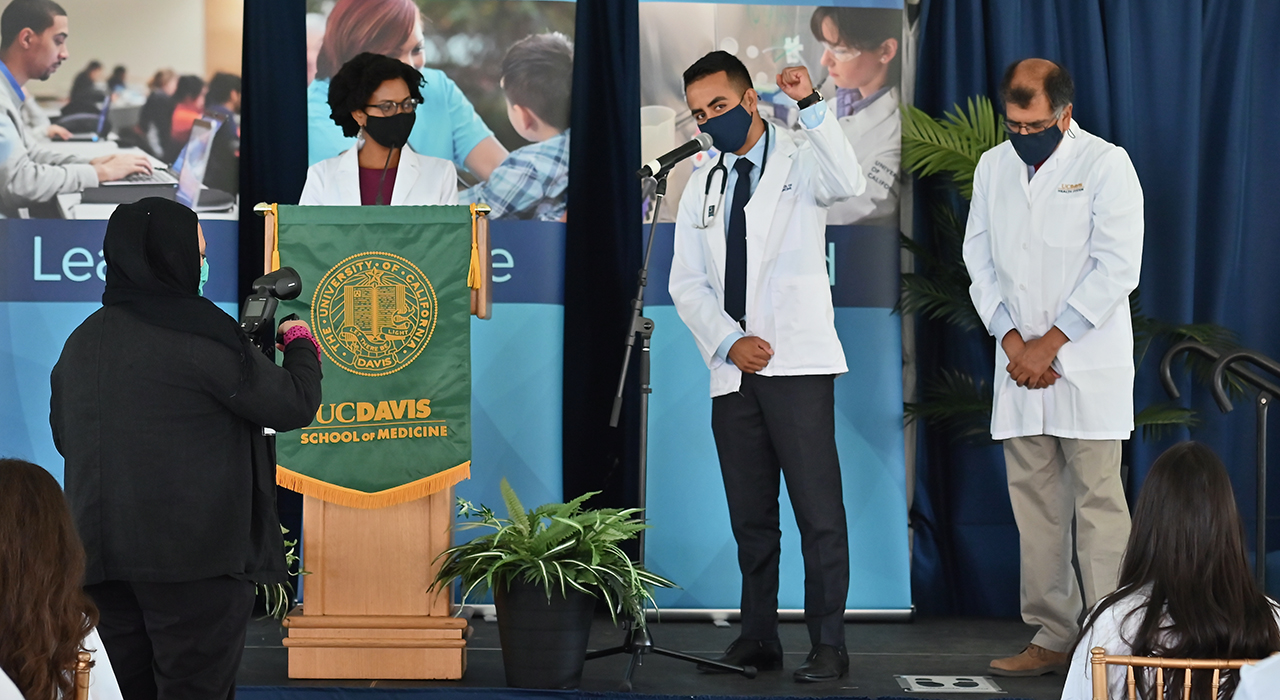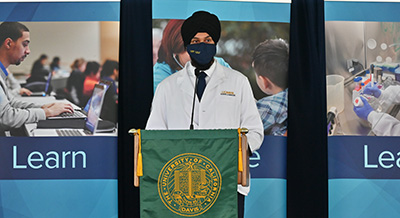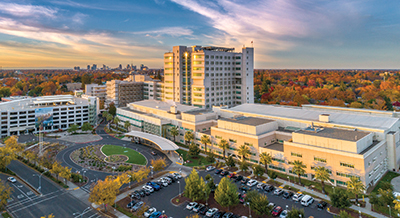Alex Villegas worked as a physical therapy aide for more than a year after graduating from UC Davis, unsure how to make the most of his hard-earned biology degree. Then one day, his boss summoned him into the office.
The manager was concerned that Villegas, who is highly empathetic to patients and savvy about musculoskeletal health, wasn’t living up to his career potential. He wanted to know what Villegas saw himself doing in five years.
Villegas, unprepared for the question, blurted out that he was considering going back to school for physical therapy. But the manager, Edgar Villanueva, had another vision: “I looked him straight in the eye and said, ‘you should not be a physical therapist, you should be a doctor.’ ”
That conversation in 2017 propelled Villegas on a new journey — one that brought him to the UC Davis School of Medicine where he started classes this month as a first-year medical student.
His path to Sacramento has been an unconventional one. Along the way, Villegas worked in construction, labored as a farmworker and was first in his extended Mexican immigrant family to complete high school. Lately, he has dedicated quality time to being with his father who is on hospice care with cancer. The experience has reinforced his decision to study medicine.
“My path toward medical school has been everything but a straight line,” Villegas said. “Initially, I couldn’t believe I had gotten accepted, and I got really emotional, because of all the sacrifices my parents had done to get me to this point.”
Work ethic instilled at an early age
Villegas, 28, was born in Modesto, the oldest of three boys. The family moved to Turlock, where the kids spent weekends operating power tools with their dad, a farmworker and truck driver who supplemented his income by repairing homes.
“Work was my dad’s way of showing me the value of what he calls ‘ganas,’ or the desire to succeed,” Villegas said.
Whenever Villegas contemplated his future, college was never in the picture, not even in a thought bubble. His parents had cut short their own schooling by the seventh grade in the rural Mexican state of Michoacán, and nobody in the family, including aunts, uncles and cousins, had ever been to college.
Villegas was a bookworm. His family called him el estudioso, the studious one.
At Turlock High, teachers steered Villegas into AVID, short for Advancement Via Individual Determination, a school-based organization that provides college track resources for students from diverse and underrepresented demographic groups.
Following his junior year, Villegas sought summer work at McDonalds and Taco Bell to pay for college applications, but got rejected. Instead, he took a job as a farmworker picking blueberries, onions and chili peppers.
His parents tried to talk him out of ag work. Deep inside, though, he had a personal reason for wanting to work in the fields: “Part of me wanted to see the work that my parents did, to know what they’ve gone through.”
On his first day in a Stanislaus County field, Villegas earned just $26 in a seven-hour shift. The job paid by the quantity of crops he picked instead of a minimum wage.
He empathized with coworkers who suffered from pesticide-related medical issues, no health insurance, lack of transportation and low wages.
“At the time I didn’t know I wanted to be a doctor,” Villegas said, “but I knew I had to do something for my community.”
Deciding to study at UC Davis
During his senior year, Villegas received a generous scholarship from California State University, Stanislaus. He chose UC Davis instead for its strong reputation in science education. In doing so, he became the first student from Turlock High’s AVID program to attend a UC school.
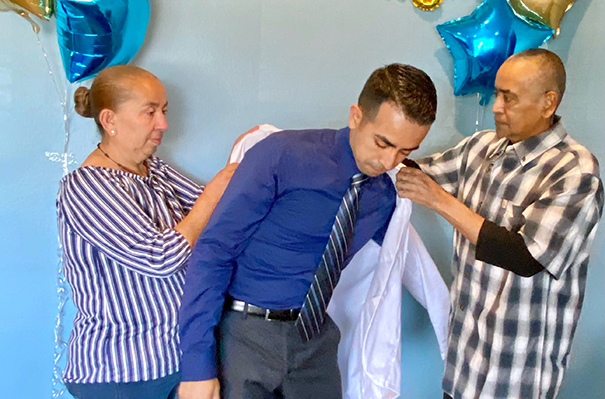
Moving 100 miles to Davis was bittersweet. He would pursue a higher education, yet be far from his father, his role model. Villegas apologized to his dad for no longer being able to help with construction jobs. He recalled how his father put his arm around him and said everything would be fine and encouraged his son to study hard.
“Something my dad told me that kind of stuck to me is that to keep growing as a person, you have to take risks and step out of your comfort zone,” Villegas said. “Like when my parents came from Mexico.”
At UC Davis, he took science courses and worked in research for Chicana/o Studies, surveying the needs of farmworkers. On weekends, he volunteered in the Knights Landing One Health Center, a student-run clinic that provides free health care in rural Yolo County.
At one point he thought about a career in medicine, but the goal seemed unattainable.
Villegas graduated in 2016, debt free, thanks to federal and state grants, and gravitated back home. He took the job as an entry-level physical therapy aide in the hospital where he was born, Doctor’s Medical Center in Modesto.
He loved every aspect of patient care and didn’t really aspire to a higher career goal. But that one heart-to-heart conversation with his manager motivated Villegas to realize the potential others saw in him.
“Ultimately, my boss wanted whatever I would be happy with, whether that was physical therapy or medical school, but he always encouraged me to reach for the stars and not give up on my initial aspirations.”
Villegas gave serious thought to studying medicine. Eventually, he enrolled in the UC Davis yearlong Postbaccalaureate Program. The well-regarded program, heavy on science curriculum, also offers study tips and test-taking strategies for college graduates who want to apply to medical school.
Afterward, Villegas returned to Modesto and to his therapy aide job, while also studying for the Medical College Admissions Test. He took a leadership role in MiMentor, an organization that supports students from diverse backgrounds to become health professionals.
Tragedy prompts him to rethink medical school
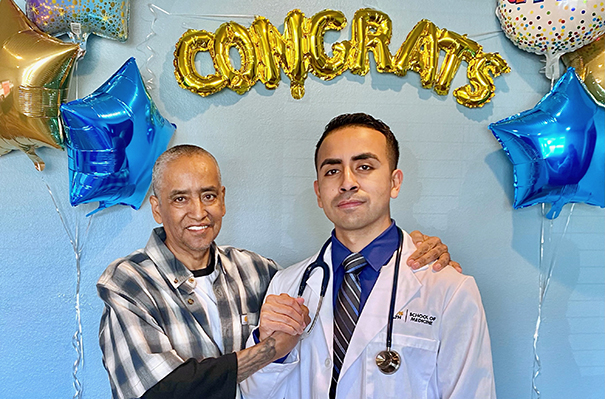
Then tragedy struck the family: His father was diagnosed with liver cancer.
Villegas drove his dad from one specialist to another while debating whether to apply to medical school or wait until later. “I wanted to be around my family,” he said.
He discussed his dilemma with his parents. His father, as usual, encouraged Villegas to continue pursuing his goals. And his supportive brothers promised to look after their dad. Villegas then decided to apply.
On Dec. 15, 2020, Villegas received an unforgettable phone call. It was Charlene Green, the UC Davis School of Medicine admissions director.
Villegas was one of nearly 10,000 students who applied to the school. Suddenly, he was one of only 132 who would enroll.
“I just froze,” Villegas recalled of his conversation with Green. “I didn’t say anything for maybe 10 seconds, a good 15 seconds.” Villegas couldn’t believe he had been accepted, but soon realized it was affirmation for his hard work.

